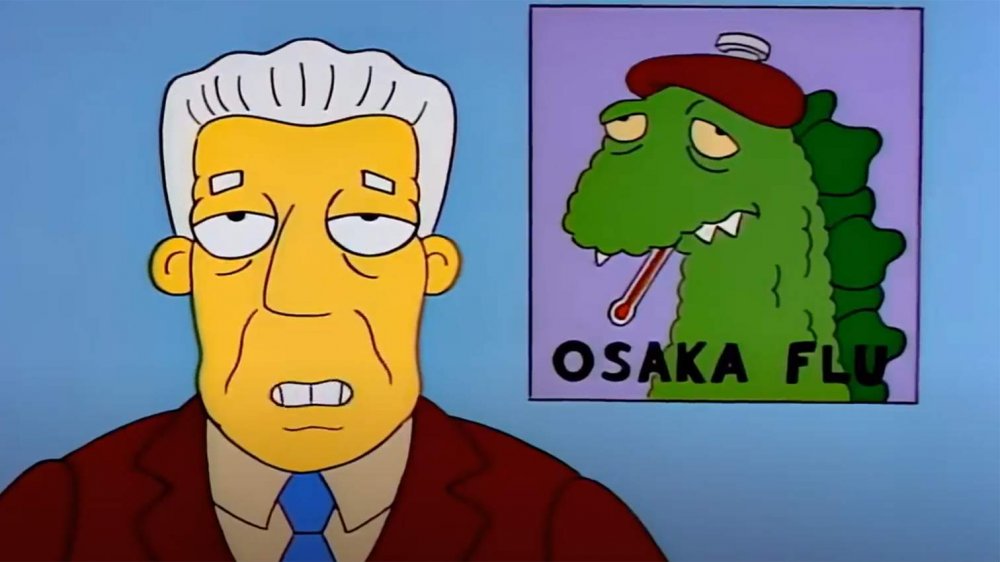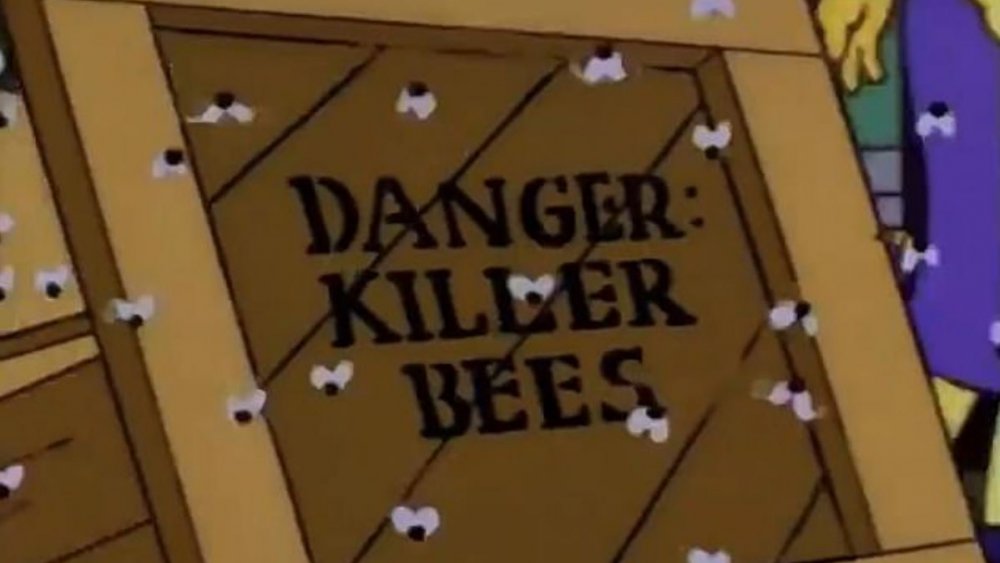Did A 1993 Simpsons Episode Predict The Coronavirus And Murder Hornets?
It isn't as if series creator Matt Groening is the modern-day Nostradamus or anything, but The Simpsons has shown a pretty uncanny ability to predict the future (or so it would appear). With the recent arrival of Asian giant hornets — otherwise known as "murder hornets" — in the Pacific Northwest of the U.S., fans are claiming confirmation of yet another prophecy out of Springfield.
The Simpsons has been on the air consistently since 1989. Over that long run, real-world events have tracked the plot of past Simpsons' episodes with surprising frequency. Some of these animated "predictions" are likely coincidental; who couldn't have called Lady Gaga making an appearance at a Super Bowl half-time show? Others have been straight-up eerie, like a sight gag from 1996 that pretty explicitly forecasted the merger of 20th Century Fox and Disney that was executed IRL in 2019.
This latest discovery, which user @didgeridougrou shared on Twitter, seems to fit in the latter category. But is that really accurate?
A 1993 episode of The Simpsons appears to have predicted the dystopian sci-fi reality of life in 2020. The season 4 episode entitled "Marge in Chains" includes a visibly symptomatic Asian worker who kicks off a pandemic of the "Osaka Flu" by sneezing on a shipment of Japanese juicers. The notion of a pandemic disease making the jump from Asia to the U.S. isn't totally outside the realm of likely coincidence considering how many goods are imported and exported between the territories, as well as how frequently people travel to and from both places, but that's not the only plot element that seems to reflect the current state of the world.
Later on in the episode, panicked Springfielders learn that the only cure for the Osaka Flu is bedrest, and that anything they could take as a "treatment" would just be a placebo. When one woman asks where such placebos can be found, a man points to a truck, believing placebo drugs could be in there. The truck actually contains killer bees, and when the group of Springfielders knock it over, the bees proceed to swarm and attack. Given the murder hornet situation in Washington State, this does seem a little bit too coincidental.
Once is a coincidence and twice is a pattern, but The Simpsons isn't truly prophetic
If it had only been the Osaka Flu, Simpsons fans might not have had enough evidence to claim prophecy, but the inclusion of the killer bee attack does bear a startling resemblance to the actual conditions on the ground in 2020. Entomologists recently announced that they discovered invasive Asian giant hornets in rural Washington for the first time. Nicknamed "murder hornets," the scary giant insects spend their days roaming the countryside and beheading honeybees, and deliver incredibly painful stings that can be fatal to humans when they attack in a swarm (via CBS News).
However, The Simpsons is just a television series, not some kind of supernatural soothsayer.
Although fans love to run with theories of the series predicting the future, Bill Oakley, one of the episode's writers, threw water on the notion that The Simpsons has any actual oracular ability. Oakley told The Hollywood Reporter that he didn't "like [the episode] being used for nefarious purposes," and noted that the show isn't really prophetic. His main concern appears to be that some people might use the plot of "Marge in Chains" to fan the flames of unfounded conspiracy theories that the Chinese government was somehow deliberately involved in the creation or spread of the novel coronavirus.
"The idea that anyone misappropriates it to make coronavirus seem like an Asian plot is terrible. In terms of trying to place blame on Asia — I think that is gross," Oakley said. "I believe the most antecedent to [Osaka Flu] was the Hong Kong flu of 1968. It was just supposed to be a quick joke about how the flu got here. It was meant to be absurd that someone could cough into a box and the virus would survive for six to eight weeks in the box. It is cartoonish. We intentionally made it cartoonish because we wanted it to be silly and not scary, and not carry any of these bad associations along with it."
He added that "there are very few cases where The Simpsons predicted something," and it's "mainly just coincidence because the episodes are so old that history repeats itself."
So, while it may appear that The Simpsons predicted the coronavirus and murder hornets, it's all just a spooky coincidence — meaning that fans unfortunately can't scan the show's back catalogue to figure out how the world will recover from everything it's facing now.

